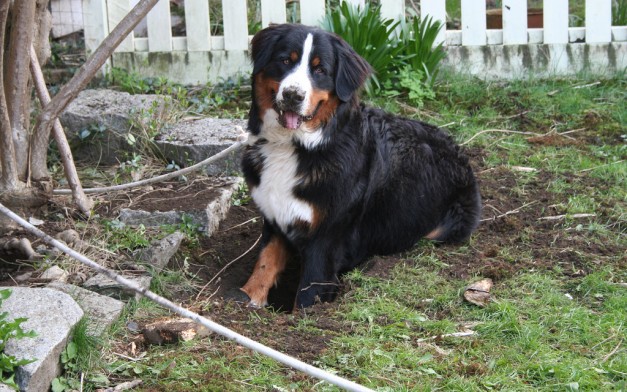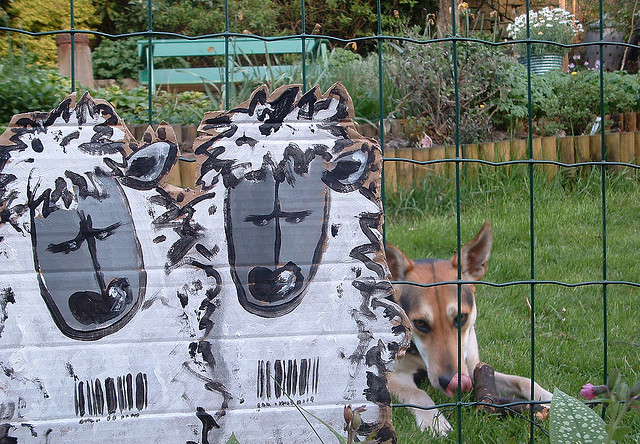How To Keep Dogs Out Of Your Garden

photo credit: Flickr
Unlike cats and other smaller critters which are more of annoyance than anything, dogs can do some real damage to both new and established gardens. If you own the dog and he or she is digging holes where he or she shouldn’t be, you have some time and motivation to train your pet. However, keeping dogs out of your garden is not so simple if they below to the neighbors and run loose.
Also unlike cats, strange dogs can be dangerous if dealt with improperly. Rather than confront them in person and try to scare them off, let’s take a look at some ways to prevent them from entering your property in the first place, or at least help them to lose interest over time.
There is no magic one-size-fits-all solution, but there are many different approaches that you can try to deter dogs and make sure they leave your gardening efforts alone.
The Natural Way: Take Advantage Of Smells
Dogs have a strong sense of smell and like humans, there are some smells that they just don’t like. Using these smells around your garden can often act as a good way of deterring dogs.
One example is using spices. You can mix strong dried spices together (like dried mustard and crushed dried peppers) and then use that mixture on your beds. The smells can be irritating, and over time the animal will learn that this is not a cool place to sniff. Dogs are stubborn, but they are also smart, which works to your advantage in this case.
However, this method doesn’t work as well in wet climates, because rain will make the effect less potent and you will need to reapply it. Also, next time you dig in your flower bed you’ll have mustard stains on your gloves and spicy fingers! You might also want to try citrus peels because dogs can’t stand the smell of citrus.
An alternative and less condiment-focused approach is picking bitter flavors. One way of doing this is to use a mixture of bitter orange and coffee grounds and apply it to the soil. This approach resists the rain better and will tend to work even in wet climates. Additionally, the coffee grounds can be good for the garden. Starbucks actually gives away coffee grinds to gardeners if you ask, so you don’t need to drink 10 cups a day to collect enough to use 🙂
You can also include plants in your garden that have a strong smell that dogs don’t like, such as rue, scaredy cat (real thing!), or citronella. Dogs will often avoid these plants and the area that they are in. However, unless you have the plants throughout the garden already, it may be a pain or impossible to plant new stuff right now.

Even then, dogs are very much like people in that they have unique personalities. You may find that the neighbor’s dog has a strange affinity for lemons and pepper, or is completely unaware that he’s supposed to dislike the smell of rue. When I had my problems with cats last year, they simply did not respond to any natural deterrents I tried.
A more artificial approach is to purchase dog repellant granules or similar products. These also have a much stronger smell smell that dogs find unappealing. As with most smell-based approaches, you will need to reapply the repellant when it stops being effective. This isn’t always convenient, especially if you have food items growing where they are digging.
Make The Texture Unappealing
The texture of your garden is one of the main reasons that dogs like it so much in the first place. Using a mulch that dogs find challenging to walk on can be a way of getting dogs off the garden. One example of this is using pine cones as a mulch.
Some gardeners also choose to disperse pruned branches from rose bushes into their garden. Dogs don’t like getting poked so after and experience or two they will tend to avoid the garden and look for a more convenient place to poop or dig (or both).
Another thing to attempt is to push sticks into the garden bed. This can take a lot of time to cover a large area, but if you are running out of ideas, anything is worth trying. This prevents dogs from finding a smooth spot to lie down on. It also makes it much harder for dogs to dig in the garden. You can also place rocks in the garden for a similar effect.
Time to implement is one problem you’ll face, since covering the entire area with enough sticks to fully protect every square inch will be time consuming. This is especially true if the animal can get in from multiple entrances. Another problem you’ll run into is cost. Unless you have a bunch of sticks laying around, buying 500 chop sticks is something you’ll have to think about.
Animal Decoys
If simple tricks like I mentioned above are not working, then you may have to take your efforts a step further. A more unusual approach to tackling the problem of dogs in your garden is using animal decoys. You might actually be able to convince the dog that there is a predator in the garden that they should avoid. Of course, he effectiveness depends on how smart the dog is.

This guy is obviously not scared of these mean-looking sheep. photo credict: flickr
One example of this is using red LED lights to mimic the eyes of a predator. Likewise, there are also products that will flash light to convinced animals that they have been discovered. Both of these approaches only work at night, and most products are light sensitive and will automatically operate at night only.
A very similar method to animal decoys is using a motion sensor sprinkler to scare the dogs away. Although it doesn’t look much like something a big dog would be scared of, the quick and surprising motion is definitely enough to frighten them! Especially if the neighbor’s pet is sneaking in at night or the early morning, a spray of water to the face coming out of the black night can definitely be effective.
Motion sensor sprinklers detect motion in night and day, and have a range of over 180 degrees. They also have varying sensitivity, so they work with both large and small animals.
Of course, they don’t work all the time. Especially if your issue with digging is related to a pet or a particularly playful dog, you might run into the situation shown in the video below. Maybe the distraction of playing will be enough to tire them out!
Last Resort: Fencing The Area
As frustrating as it sounds, sometimes the best solution to keep dogs out is to fence the area. All of the approaches I talked about above can work, but it ultimately comes down to the personality of the dog. Some dogs are very stubborn and keep trying to find ways into the garden. They may even be entertained by your efforts, which makes the situation even more frustrating.
Ideally, you want to be using a fence that is strong enough to withstand any dogs and high enough that they will not jump over it. You do have to make sure you don’t leave the gate open, otherwise the fence ends up being pretty pointless.
You can also use more temporary fencing, like chicken wire or woven wire. This type of fence doesn’t typically have a gate, but you can set it up so one end can be unhooked and moved aside to allow you access to the garden.
If the dogs you are having trouble with are your own, you can often train them to stay on one side of the fence. This makes it possible to use a lower or less intrusive fence that serves as just a reminder of the rules.
You can also use natural fences, like a row of shrubs to keep the dog out of the garden, but it takes time to grow them, and they may need protection for a few years until they grow big enough. You could also consider combining any of the above methods for a multi-prong attack, like putting plants at the bottom or outside of the fence to prevent any animals from approaching, climbing, or digging under the fence.
Categorised in: Animals

2 Comments
Recently we have been having a lot of stray animals come into our yard and in our garden. You mentioned that there is no magic one-size-fits-all solution but there are many different approaches that you can try to deter dogs and make sure they leave your gardening efforts alone. I didn’t realize there were so many different options to choose. Are there any sound repellent solutions available?
I don’t have any sound defense products reviewed just yet, but that’s a great idea to work on. I’ll post a link here after I start working on them!